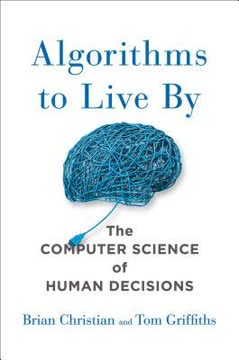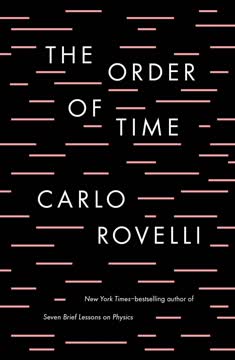Key Takeaways
1. Embrace Change and Uncertainty in Life
Tempora mutantur, nos et mutamur in illis: 'The times change and we change with them.'
Change is inevitable. Throughout history, technological advancements have transformed societies in ways that were often unpredictable. The key is to adapt and evolve with these changes rather than resist them.
- Examples of transformative technologies:
- Television
- Penicillin
- Internet
- Artificial Intelligence
Prepare for the future. While we cannot predict exactly how the world will change, we can cultivate skills that will remain valuable. The future job market is likely to focus on:
- The Three Cs:
- Creatives
- Carers
- Custodians
By embracing change and developing adaptable skills, you position yourself to thrive in an uncertain future.
2. Cultivate Curiosity and Challenge Conventional Wisdom
Curiosity does not kill the cat.
Question everything. Like Copernicus and Galileo, who challenged the accepted wisdom of their time, it's essential to think critically and not blindly accept authority. This mindset leads to innovation and progress.
Embrace failure as learning. Entrepreneurs and scientists understand that failures are stepping stones to success. James Dyson built 5,127 prototypes before perfecting his vacuum cleaner.
- Ways to cultivate curiosity:
- Travel with an open mind
- Ask "Why?" and "How?"
- Explore diverse subjects
- Challenge your own beliefs
Remember, creativity often stems from questioning the status quo and being willing to make mistakes.
3. Develop Multiple Intelligences Beyond Academia
You are not a human resource.
Intelligence is multifaceted. Academic success is just one form of intelligence. Howard Gardner's theory of multiple intelligences suggests there are at least eight types, including musical, interpersonal, and spatial intelligence.
Value practical skills. While formal education is important, many crucial life skills are learned through experience and cannot be taught in a classroom.
- Essential life skills:
- Building relationships
- Managing finances
- Adapting to change
- Problem-solving
- Emotional intelligence
Focus on developing a well-rounded set of skills and intelligences to navigate life successfully.
4. Prioritize Relationships and Teamwork
'We' beats 'I' all the time.
Invest in relationships. Strong connections with family, friends, and colleagues are crucial for personal and professional success. These relationships provide support, learning opportunities, and a sense of belonging.
Foster effective teamwork. The rowing eight model demonstrates ideal team dynamics:
- Roles in a rowing eight:
- Captain (official leader)
- Stroke (sets the pace)
- Cox (steers and guides)
- Coach (provides outside perspective)
By valuing relationships and understanding effective teamwork, you can achieve more than you ever could alone.
5. Find Purpose and Balance in Work
Doing the best you can with what you are best at.
Discover your golden seed. Everyone has a unique talent or aptitude. Identifying and nurturing this "golden seed" can lead to a fulfilling career and life.
Seek work-life integration. Rather than striving for work-life balance, aim for integration where different aspects of your life complement each other.
- Components of a balanced work life:
- Paid work
- Voluntary work
- Home work
- Study work
Remember that work should be more than just earning money; it should provide a sense of purpose and allow you to express your unique talents.
6. Practice 'Enough' Philosophy in Money and Life
Enough is as good as a feast.
Define your 'enough'. Constantly pursuing more can lead to dissatisfaction and burnout. Determine what is truly necessary for your happiness and fulfillment.
Invest wisely, spend mindfully. Distinguish between investments (things that provide long-term value) and expenditures (short-term consumption).
- Examples of investments:
- Education
- Quality tools for your profession
- Experiences that broaden your perspective
By embracing the concept of 'enough', you can find contentment and focus on what truly matters in life.
7. Prepare for a Meaningful Fourth Quarter of Life
I never expected that my later years would be my most enjoyable years, but so it has proved.
Plan for longevity. With increasing life expectancy, the "fourth quarter" of life (from 75 to 100) can be a time of fulfillment and new opportunities.
Stay active and engaged. Retirement doesn't mean stopping all work. Instead, it's an opportunity to pursue passions and contribute to society in new ways.
- Preparation for the fourth quarter:
- Financial planning
- Health maintenance
- Lifelong learning
- Building a support network
By preparing early and maintaining a positive outlook, you can make your later years some of the best of your life.
8. Recognize Your Uniqueness and Potential
There is no one like anyone else, ever.
Embrace your individuality. Your unique combination of experiences, talents, and perspectives makes you irreplaceable. Recognize and celebrate this uniqueness.
Continuously discover yourself. Self-knowledge is a lifelong journey. Regularly reflect on your values, goals, and experiences to better understand and express your true self.
- Ways to explore your uniqueness:
- Try new experiences
- Seek feedback from others
- Reflect on your passions and strengths
- Challenge your comfort zone
By recognizing your uniqueness and continually exploring your potential, you can lead a more authentic and fulfilling life.
Last updated:
FAQ
What is "21 Letters on Life and Its Challenges" by Charles B. Handy about?
- Personal Letters of Wisdom: The book is a collection of 21 letters written by Charles Handy to his grandchildren, offering reflections and advice on navigating life’s complexities.
- Themes of Change and Continuity: It explores how life changes over time, what remains constant, and how to adapt to both.
- Philosophical and Practical Guidance: Handy blends philosophical insights with practical advice, drawing from his own experiences in work, family, and society.
- A Legacy of Learning: The letters serve as a legacy, sharing the lessons Handy wishes he had known when he was young, and encouraging readers to think deeply about their own lives.
Why should I read "21 Letters on Life and Its Challenges" by Charles B. Handy?
- Timeless Life Lessons: The book distills decades of wisdom into accessible, relatable letters that address universal challenges and questions.
- Intergenerational Perspective: Written for his grandchildren, Handy’s advice is relevant for readers of all ages, making it a valuable resource for anyone at a crossroads.
- Blend of Philosophy and Real Life: Handy connects big philosophical ideas with everyday decisions, making abstract concepts practical.
- Encourages Self-Reflection: The book prompts readers to reflect on their own values, choices, and the meaning of a fulfilling life.
What are the key takeaways from "21 Letters on Life and Its Challenges" by Charles B. Handy?
- Embrace Change: Life is always changing; adaptability and openness to new experiences are crucial.
- Value of Work and Identity: Who you are matters more than what you do; work should be meaningful but not all-consuming.
- Importance of Relationships: Companionship, friendship, and family are central to a good life.
- Proper Selfishness and Virtue: Balancing self-care with care for others leads to fulfillment; virtues like courage, kindness, and honesty are essential.
- Limits of Measurement: Not everything that counts can be counted; intangible qualities like love, beauty, and kindness matter most.
How does Charles B. Handy define a meaningful life in "21 Letters on Life and Its Challenges"?
- Doing Your Best with Your Best: Handy, drawing on Aristotle, suggests that fulfillment comes from doing the best you can with what you are best at, while being a good person.
- Self-Discovery and Growth: Life is a journey of discovering your unique talents (“golden seed”) and nurturing them.
- Virtue and Contribution: A meaningful life involves living virtuously and contributing to the well-being of others.
- Balance and Reflection: Regular reflection, rest, and balance between work, play, and relationships are key to a purposeful life.
What is the "golden seed" concept in "21 Letters on Life and Its Challenges" by Charles B. Handy?
- Unique Potential: The "golden seed" refers to each person’s unique talent, skill, or aptitude that, when nurtured, leads to self-fulfillment.
- Discovery and Growth: It’s important to discover this seed early, often with the help of parents, teachers, or mentors, and give it room to grow.
- Purpose and Satisfaction: Using your golden seed to do meaningful work brings satisfaction and a sense of purpose.
- Role of Others: Sometimes others can see your golden seed more clearly than you can, highlighting the importance of supportive relationships.
How does "21 Letters on Life and Its Challenges" by Charles B. Handy address the role of work in life?
- Work as Central, but Not All: Work is a central part of life, providing meaning and structure, but should not define your entire identity.
- Changing Nature of Work: Handy discusses how work has shifted from stable, lifelong careers to more flexible, portfolio-based lives.
- Portfolio Life: He advocates for a “portfolio life,” combining different types of work (paid, unpaid, passion projects) for fulfillment and security.
- Work-Life Balance: The book emphasizes the importance of balancing work with rest, reflection, and relationships.
What advice does Charles B. Handy give about dealing with change and uncertainty in "21 Letters on Life and Its Challenges"?
- Change is Inevitable: Handy stresses that change is a constant in life, and resisting it leads to stagnation.
- Adaptability and Curiosity: Embracing curiosity, being willing to learn, and staying open to new experiences are key to thriving amid uncertainty.
- S-Curve Model: He introduces the idea of life’s “S curves,” encouraging readers to start new ventures before the old ones decline.
- Learning from Mistakes: Mistakes and failures are valuable learning opportunities; don’t be afraid to experiment and adapt.
How does "21 Letters on Life and Its Challenges" by Charles B. Handy explore the importance of relationships and community?
- We Over I: Handy argues that companionship, friendship, and teamwork are more rewarding than solitary achievement.
- Invest in Relationships: Building and maintaining close relationships requires effort, kindness, and honesty.
- Community and Society: He discusses the importance of being an active citizen, contributing to society, and not relying solely on “they” (authorities) to solve problems.
- Marriage and Partnerships: Handy shares personal stories about the evolving “contracts” in marriage and the need for ongoing negotiation and fairness.
What does Charles B. Handy mean by "proper selfishness" in "21 Letters on Life and Its Challenges"?
- Self-Care as Foundation: Proper selfishness means looking after your own needs and well-being so you can be of use to others.
- Balance with Altruism: It’s not about being self-centered; true fulfillment comes from giving to others after ensuring your own stability.
- Ethical Living: Handy ties this to philosophical ideas like Kant’s categorical imperative and the Golden Rule, advocating for ethical self-interest.
- Avoiding Burnout: By practicing proper selfishness, you avoid burnout and are better equipped to contribute positively to the world.
How does "21 Letters on Life and Its Challenges" by Charles B. Handy critique the measurement of success and the use of numbers?
- Limits of Quantification: Handy warns against the “McNamara Fallacy”—believing only what can be measured is important.
- Intangibles Matter Most: Qualities like love, kindness, beauty, and happiness can’t be quantified but are central to a good life.
- Beware of Metrics: Over-reliance on numbers (money, test scores, bonuses) can blind us to what truly matters.
- Personal Examples: Handy shares stories where chasing numbers led to poor decisions, emphasizing the need for balance.
What are the most important virtues and values according to "21 Letters on Life and Its Challenges" by Charles B. Handy?
- Aristotelian Virtues: Handy highlights Aristotle’s list of virtues, including courage, temperance, generosity, pride, honor, good temper, friendliness, truthfulness, wit, friendship, and justice.
- Golden Mean: He emphasizes the importance of balance—virtues taken to extremes become vices.
- Emotional Intelligence: Modern concepts like emotional intelligence are seen as extensions of these classical virtues.
- Learning by Example: Virtues are best learned by observing and imitating respected elders, parents, and mentors.
What are the best quotes from "21 Letters on Life and Its Challenges" by Charles B. Handy and what do they mean?
- “Doing the best you can with what you are best at.” – This encapsulates Handy’s philosophy of fulfillment through self-knowledge and virtue.
- “What you can’t count matters more than what you can.” – A reminder that the most important aspects of life are often intangible and immeasurable.
- “Life is a marathon, not a horse race.” – Success is about personal growth and endurance, not beating others in competition.
- “You are not a human resource.” – People should not be treated as mere tools for productivity; individuality and dignity matter.
- “To thine own self be true.” – Quoting Shakespeare, Handy urges readers to live authentically and with integrity.
Review Summary
21 Letters on Life and Its Challenges receives overwhelmingly positive reviews, with readers praising its wisdom, practicality, and thought-provoking content. Many find it heartwarming and inspiring, likening it to advice from a wise grandfather. The book's format of letters to grandchildren is appreciated for its personal touch. Some readers plan to revisit the book multiple times. While a few critics find it lacking originality, the majority highly recommend it for its valuable life lessons and insights.
Similar Books










Download PDF
Download EPUB
.epub digital book format is ideal for reading ebooks on phones, tablets, and e-readers.












